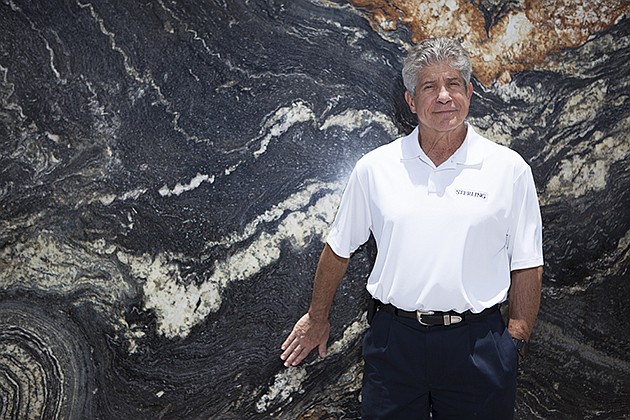- November 24, 2024
-
-
Loading

Loading

Forget the granite, marble and quartz countertops and high-end cabinets, the hubbub of two large production facilities and the 1,000 square feet of stone cut and fabricated a day.
Sarasota-based Sterling is really a technology firm disguised as a bathroom and kitchen countertop and cabinet manufacturing and installation business. The company is nearly entirely paperless, and every parcel of work on a project, from high-resolution photos to laser-precision cutting machines, is enhanced or done digitally. About 80% of the company's clients are homebuilders on the Gulf Coast, from national firms to locally based builders.
“I think to be successful in this business you have to evolve with technology,” Sterling President Tom Shapiro says. “When you can have something that's better, cheaper and faster, that's what any business is looking for.”
That approach, beyond the efficiency and competitive advantages, has enabled Sterling to accomplish two other feats: It survived the downturn and now is growing again. Sales are up 20% in each of the last two years, says Shapiro, and he expects to grow at least that much in 2016. The firm, with about $25 million a year in revenues, handles more than 4,000 projects a year and has about 85 employees.
Shapiro bought Sterling in 2002, a few years after he sold a $150 million steel business he ran in northeast Ohio. After a short retirement, where he made some money day trading stocks, Shapiro sought to get back into a tangible business. “I wanted to have something I could put my hands on,” he says. “I wanted something I could touch and feel.”
His focus on technology started soon after he bought Sterling from another cabinet manufacturer, Ray Routh. He bought several new digital cutting and precision fabrication machines, an upgrade over manual saws. That's especially key in cabinets and countertops because cutting a piece of stone short, even one inch, can render that piece useless. “We greatly increased the capacity and reliability,” says Shapiro.
Another important addition was to add dust-collection bins and systems to machines. That became an employee recruitment and retention piece, given the cleaner work environment. “We are the only (countertop) place in this part of the state that has dust collection,” says Shapiro.
The embrace-technology strategy was in full effect last year, when Shapiro sought to expand the countertop side of the business by investing in a bigger facility. He found a spot, a 25,000-square-foot former stone fabrication plant less than a mile from Sterling's main space, another 25,000-square-foot facility/office. Both facilities are off of Fruitville Road, east of Interstate 75.
The building's owners, Sarasota-based AltMed, a medical marijuana company, bought the complex for $2 million. But with the production side of the business on hold after a medical marijuana bill in Florida failed last year, AltMed leased the space to Sterling. Shapiro says he's in talks with AltMed about buying the space.
The new space has some of the guts of a stone fabrication plant, from the earlier tenant, such as an overhead 5-ton crane lift and a water treatment plant. The water treatment system is necessary because top-of-the-line stone cutting machines, says Shapiro, use water pressure to make a safer and better cut.
Sterling invested more than $1 million in the plant. The firm spent $175,000 to improve the water treatment and filtration system, and another $350,000 on a specialized laser-cutting machine called a Fusion.
Shapiro, like many manufacturing peers, says his biggest challenge is also his biggest worry: finding and keeping top employees to sustain growth. His other worry, if and when the housing market falters, is cushioned by having a diverse client list of big and small builders. Says Shapiro: “I think we will have a soft landing.”
Follow Mark Gordon on Twitter @markigordon